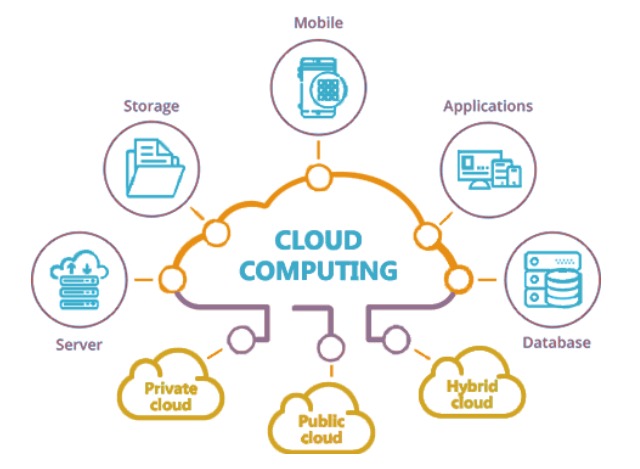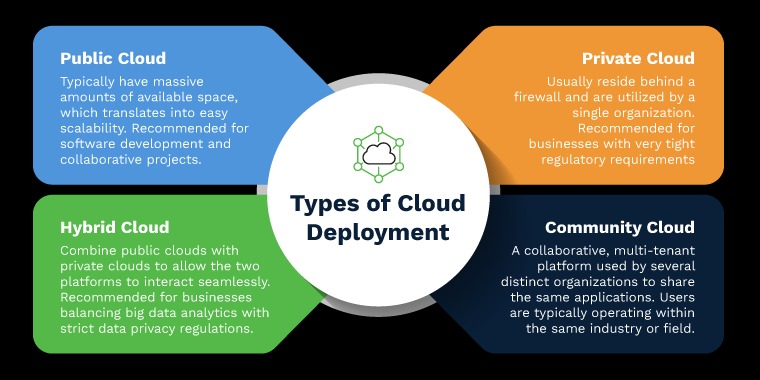What is Cloud Computing? In today’s digital age, the way we consume and access information has drastically changed. With the rise of the internet, the demand for efficient and accessible computing services has increased exponentially. This is where cloud computing comes in. But what exactly is cloud computing? How does it work? And what are its benefits? In this article, we’ll dive deep into the world of cloud computing and explore everything you need to know about it.
Introduction to Cloud Computing
Cloud computing has become a buzzword in the tech industry, but many people are still unsure of what it actually means. In simple terms, cloud computing refers to using internet-based services to provide computing resources like servers, storage, and software to users. These resources are accessible over the internet, allowing users to access their data and applications from anywhere at any time.

Before the advent of cloud computing, organizations had to invest in physical infrastructure to run their services. This included buying servers, storage devices, and other hardware, which was expensive and complex. Additionally, companies often had to buy more resources than they needed, resulting in unused resources that were not cost-effective.
The Evolution of Computing Services
The concept of cloud computing has been around for decades, but it wasn’t until the mid-2000s that it gained mainstream popularity. The advent of virtualization technology paved the way for cloud computing, making it possible to create multiple virtual machines on a single physical server.

The first major player in the cloud computing market was Amazon Web Services (AWS), which launched in 2006. This allowed businesses to rent computing resources instead of buying and managing their own infrastructure. Other tech giants like Google and Microsoft soon followed suit, offering similar services.
Benefits of Cloud Computing
Businesses across industries have embraced cloud computing due to its numerous benefits. Let’s take a closer look at some of these benefits:
Cost Savings
One of the primary advantages of cloud computing is cost savings. Instead of investing in expensive physical infrastructure, users pay for computing resources on a pay-per-use basis. This means they only pay for what they use, making it a more cost-effective option. Additionally, companies save on maintenance costs, as the physical upkeep of servers and other hardware is taken care of by the cloud provider.

Scalability
Another significant advantage of cloud computing is its scalability. Users can easily adjust their resource allocation based on their needs, adding or removing resources as required. This flexibility allows businesses to respond quickly to changes in demand without having to purchase additional hardware. This can be especially beneficial for small businesses, as it eliminates the need for upfront investments in IT infrastructure.
Performance
Cloud computing services run on large and secure data centers, providing performance and security advantages compared to smaller-scale systems. These data centers are equipped with state-of-the-art hardware and software, ensuring the smooth operation of applications and services. Additionally, providers often offer service level agreements (SLAs) guaranteeing performance standards, giving users peace of mind.
Security
Many businesses are hesitant to move their data to the cloud due to concerns about security. However, most cloud providers have robust security measures in place to protect their users’ data and applications. These include firewalls, encryption, and regular backups. Cloud providers often have dedicated security teams that continuously monitor and update their systems to ensure the highest level of security for their users.
Speed
In today’s fast-paced world, speed is crucial. Cloud computing allows users to obtain computing resources quickly, even in large quantities. This is particularly useful for businesses that need to react quickly to changing market conditions or seasonal spikes in demand. With traditional physical infrastructure, it could take weeks or even months to set up new servers. With cloud computing, these resources can be provisioned in a matter of minutes.
Productivity
Cloud computing frees up internal resources, allowing companies to focus on their core business activities. Instead of worrying about managing servers and other infrastructure, employees can focus on more critical tasks, thus improving overall productivity. Additionally, with data stored in the cloud, employees can access it from anywhere, making remote work easier and more efficient.
Reliability
Cloud providers usually have disaster recovery systems in place, protecting user data from potential outages. These systems ensure that data and applications are backed up and can be restored quickly in case of an outage or disaster. This not only provides peace of mind but also minimizes downtime, which can be costly for businesses.
Types of Cloud Deployment
There are two main types of cloud deployment: public and private. Let’s take a closer look at each of these:
Public Cloud
Public cloud services are provided by third-party providers like Amazon Web Services (AWS), Google Cloud, or Microsoft Azure. These services are accessible over the internet, and users pay for what they use. Public clouds offer a wide range of services, including infrastructure as a service (IaaS), platform as a service (PaaS), and software as a service (SaaS).

Public cloud services are popular among small and medium-sized businesses due to their cost-effectiveness and scalability. However, they may not be suitable for businesses with sensitive data or strict compliance requirements.
Private Cloud
Private clouds are dedicated to a specific organization or enterprise. These resources are not shared with other companies and are deployed within the company’s own infrastructure. This allows organizations to have more control over their data and applications and ensure compliance with regulations.
Private cloud services offer the same benefits as public clouds but are more expensive to set up and maintain. They are ideal for businesses with stringent security and compliance requirements, such as healthcare providers or financial institutions.
Advancements in Cloud Computing
Cloud computing is constantly evolving, and new technologies are emerging that will shape its future. Let’s take a look at some of these advancements:
Artificial Intelligence (AI)
Artificial intelligence has already made an impact on various industries, and it’s no surprise that it’s also making its way into cloud computing. AI-powered cloud services can help businesses automate tasks, analyze large datasets, and make predictions, among other things. This can lead to increased efficiency, improved decision-making, and cost savings for businesses.

Internet of Things (IoT)
With the rise of smart devices, the amount of data being generated has increased exponentially. Cloud computing plays a crucial role in managing this data, as it provides the storage and computing power needed to process and analyze it. With the integration of IoT and cloud computing, businesses can gain valuable insights from their connected devices, leading to better products and services.
Edge Computing
Edge computing refers to the practice of processing data closer to where it is generated rather than sending it to a central location, like a cloud data center. This reduces latency and improves performance, making it an ideal solution for time-sensitive applications, such as self-driving cars or virtual reality. Edge computing can also help reduce bandwidth costs and improve data privacy.
Future of Cloud Computing
The demand for cloud computing services shows no signs of slowing down. With the rise of remote work and digital transformation, businesses of all sizes are turning to the cloud to power their operations. Additionally, advancements in technology, such as AI and IoT, will lead to even more use cases for cloud computing.

Another significant development in the cloud computing space is the emergence of multi-cloud and hybrid cloud environments. Multi-cloud refers to the use of multiple cloud providers, while hybrid cloud combines both public and private cloud services. These approaches offer greater flexibility and allow organizations to choose the best cloud model for their specific needs.
Conclusion
Cloud computing has revolutionized the way we consume and access computing services. Its benefits, including cost savings, scalability, and performance, have made it an attractive option for businesses across industries. With advancements in technology and the increasing demand for remote work solutions, the future of cloud computing looks bright. As technology continues to evolve, it’s safe to say that cloud computing will remain a critical component of our digital economy.






